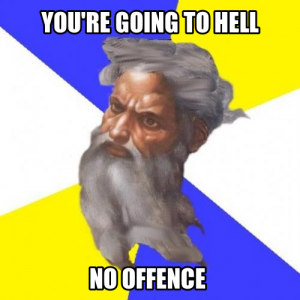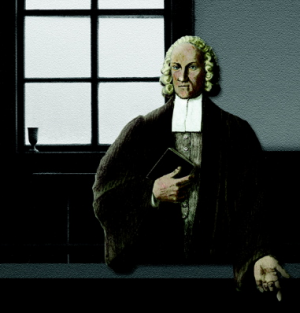
This is a little follow up post from yesterday where I said that Jesus did not in fact speak of hell more than heaven. Note that if what I proposed is true, then most of the passages in the Gospels that people think refer to hell, do not actually refer to hell.
If that is true, then there are very few passages in Scripture which do teach about hell! In fact, there may be only two or three.
And these rare passages use highly symbolic terminology which tells us that we basically know nothing about hell.
One Bible teacher whom I used to listen to a lot, believes that hell is in the center of the earth. His argument is that when the Bible talks about the grave, it uses terminology about people going down into the earth, and therefore, hell must be in the earth. I find this almost laughable, for it shows a complete disregard for biblical imagery and symbolic terminology. “Going down into the earth” refers to getting buried and returning to dust, not going to hell.
Anyway, the few passages which do in fact refer to a place of punishment speak of flames and a Lake of Fire. Does this mean that hell will actually be a place that is burning? I could be wrong, but I really doubt it.
Fire in Scripture, when used symbolically, always refers to judgment. Hell is simply going to be a place of judgment, and it is usually temporal in nature.
Hell will not be a place of torture or torment as depicted in the 1997 Science Fiction movie Event Horizon (If you haven’t seen that movie, I don’t recommend it. It’s about a group of space travelers that travel to hell. And hell is very graphically depicted in the movie.)
 So since hell is not a place where God tortures people for eternity, I almost literally shake with anger when I read these words that Jonathan Edwards preached:
So since hell is not a place where God tortures people for eternity, I almost literally shake with anger when I read these words that Jonathan Edwards preached:
The God that holds you over the pit of hell, much as one holds a spider, or some loathsome insect over the fire, abhors you, and is dreadfully provoked: his wrath towards you burns like fire; he looks upon you as worthy of nothing else, but to be cast into the fire; he is of purer eyes than to bear to have you in his sight; you are ten thousand times more abominable in his eyes, than the most hateful venomous serpent is in ours. You have offended him infinitely more than ever a stubborn rebel did his prince; and yet it is nothing but his hand that holds you from falling into the fire every moment.
Aside from his abhorrent view of hell, Edwards reveals a monstrous view of God and a despicable view of men. Forgive me for saying it, but this kind of evangelism can go to hell.
What is hell going to be like? Scripture doesn’t give us much indication.
Personally, I see a lot biblical and theological merit to the way C. S. Lewis portrayed it in his book The Great Divorce. He claimed he was not writing a theology of hell in this book, but I suspect he said that just to keep people from calling him a heretic. He pictures hell as a place where people live and exist because they want to, and where everybody gets exactly what they want. It is not torture. In that book, he wrote this:
There are only two kinds of people in the end: those who say to God, “Thy will be done,” and those to whom God says, in the end, “Thy will be done.” All that are in Hell, choose it. Without that self-choice there could be no Hell. No soul that seriously and constantly desires joy will ever miss it. Those who seek find. Those who knock it is opened.
Lewis wrote elsewhere that the doors of hell are locked from the inside.
If you think about what life would be like if everybody got exactly what they wanted, it would be hell. Eventually, people couldn’t stand to be around each other. The longer they are there, the most disconnected they would become. In this sense, hell, ultimately, is eternal loneliness. It is eternal separation from God and others.
That, of course, is pretty hellish, but it is not the same as God torturing us for all eternity. Instead, it is God granting our desire to live apart from Him and live our lives exactly as we please.
Anyway, I will write a lot more about this when I get to the subject of hell in the current book I am writing on the violence of God, but I wanted to just give a short preview of my views on hell, and provide a follow-up from the post yesterday about whether Jesus spoke of hell more than heaven.






 I attended a seminar recently on the topic of Paganism. You know… those people who worship Thor, Freya, Odin, and engage in mystical rites out in the woods, usually around a fire. No, they don’t worship Satan. No, they don’t practice black magic.
I attended a seminar recently on the topic of Paganism. You know… those people who worship Thor, Freya, Odin, and engage in mystical rites out in the woods, usually around a fire. No, they don’t worship Satan. No, they don’t practice black magic. I am butchering what C. S. Lewis said. Here is his exact quote:
I am butchering what C. S. Lewis said. Here is his exact quote: I think that the reason there are so many similarities between Christianity and other religions is not because Christianity borrowed or stole from these other religions (though some of that might have happened too), but because the Spirit of God was at work in the hearts and minds of the people who developed these religions to write eternity into their hearts, to foreshadow the Gospel of Jesus Christ, and to give men and women a longing for grace that could not be achieved in any other way than through Jesus.
I think that the reason there are so many similarities between Christianity and other religions is not because Christianity borrowed or stole from these other religions (though some of that might have happened too), but because the Spirit of God was at work in the hearts and minds of the people who developed these religions to write eternity into their hearts, to foreshadow the Gospel of Jesus Christ, and to give men and women a longing for grace that could not be achieved in any other way than through Jesus.

 The case against prayer (I mean the “low” or old-fashioned kind) is this: The thing you ask for is either good – for you and for the whole world in general – or else it is not. If it is, then a good and wise God will do it anyway. If it is not, then He won’t. In neither case can your prayer make any difference. But if this argument is sound, surely it is an argument not only against praying, but against doing anything whatever?
The case against prayer (I mean the “low” or old-fashioned kind) is this: The thing you ask for is either good – for you and for the whole world in general – or else it is not. If it is, then a good and wise God will do it anyway. If it is not, then He won’t. In neither case can your prayer make any difference. But if this argument is sound, surely it is an argument not only against praying, but against doing anything whatever?

 I am sure you have either read or watched the movie of C. S. Lewis’ classic children’s novel,
I am sure you have either read or watched the movie of C. S. Lewis’ classic children’s novel,  Following Aslan’s resurrection, C. S. Lewis has Aslan, Susan, and Lucy race off to the castle of the White Witch, where they “thaw” out all the creatures of Narnia who had been turned to stone, and then return with this army of creatures to help Peter, Edmund, and the Narnians defeat the Witch Jadis and her evil army.
Following Aslan’s resurrection, C. S. Lewis has Aslan, Susan, and Lucy race off to the castle of the White Witch, where they “thaw” out all the creatures of Narnia who had been turned to stone, and then return with this army of creatures to help Peter, Edmund, and the Narnians defeat the Witch Jadis and her evil army. To this, Lucy says, “Not to disagree, Aslan, but Queen Jadis is still very much alive. In fact, at this very moment, she is slaughtering the Narnians, and our brothers, Peter and Edmund, are in danger of being killed as well. Isn’t there anything you can do?”
To this, Lucy says, “Not to disagree, Aslan, but Queen Jadis is still very much alive. In fact, at this very moment, she is slaughtering the Narnians, and our brothers, Peter and Edmund, are in danger of being killed as well. Isn’t there anything you can do?”